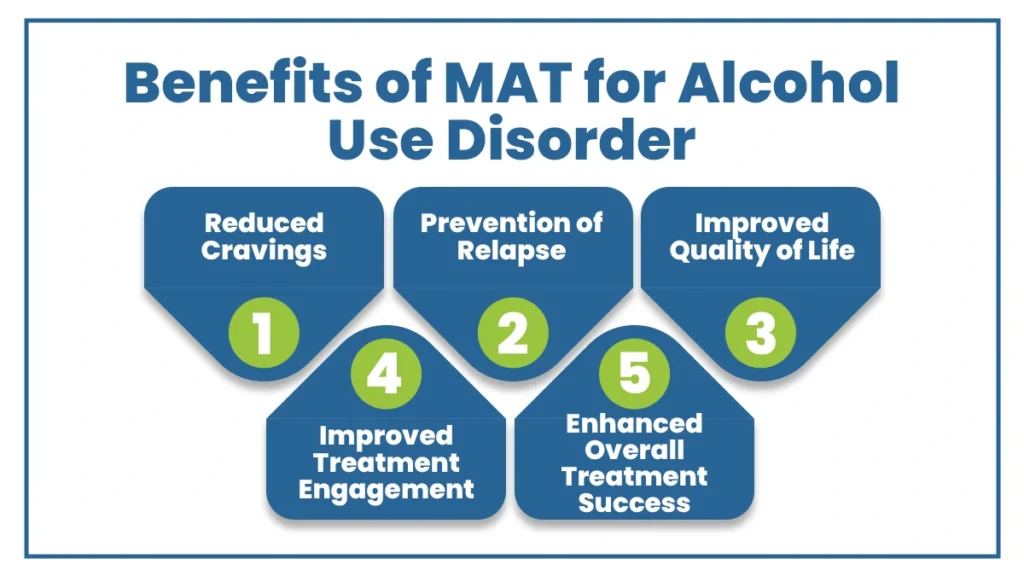Medication-assisted treatment (MAT) for alcohol use disorder represents a significant advancement in addiction care. This comprehensive approach combines evidence-based medications with counseling and behavioral therapies to mitigate withdrawal symptoms, reduce cravings, and promote long-term recovery.
By addressing both the physiological and psychological aspects of alcohol addiction, MAT offers a more holistic and effective strategy for managing alcohol use disorder.
Key Takeaways
Medication-assisted treatment helps manage cravings and withdrawal symptoms, promoting sustained abstinence from alcohol and increasing the chances of successful long-term recovery. Here’s what you need to know:
- MAT is an effective approach for addressing alcohol use disorder to enhance recovery outcomes.
- MAT medications like naltrexone, acamprosate, and disulfiram can reduce cravings, prevent relapse, and support people in overcoming alcohol dependency.
- A comprehensive approach should consider the individualized needs of patients, combining MAT with psychosocial interventions for a more effective and holistic recovery strategy.
Contact The Haven Detox-Little Rock at (501) 271-3342 for more information and personalized assistance to embrace a free life.
What is Alcohol Use Disorder?
Alcohol Use Disorder (AUD) is a chronic condition characterized by an inability to control or stop drinking despite negative consequences. Individuals with AUD may experience a range of symptoms that affect relationships, work, and health.
AUD is a spectrum disorder, with severity ranging from mild to severe, impacting millions globally. Genetic predisposition, environmental factors, and psychological elements contribute to its development.
Symptoms of Alcohol Use Disorder
The severity of AUD can range from mild to severe, and symptoms can vary. The Diagnostic and Statistical Manual of Mental Disorders, Fifth Edition (DSM-5), provides criteria for diagnosing AUD.
Here are some common symptoms associated with alcohol use disorder:
- Persistent cravings for alcohol
- Tolerance, requiring more alcohol to achieve the same effects
- Withdrawal symptoms when not drinking
- Neglect of responsibilities due to alcohol use
- Failed attempts to cut down or quit drinking
- Significant time spent obtaining, using, or recovering from alcohol
- Reduction in social, occupational, or recreational activities
- Continued alcohol use despite its impact on physical or mental health
Alcohol Use Disorder’s Toll On Health
Alcohol use disorder (AUD) exerts a profound and detrimental impact on both mental and physical health. Individuals grappling with AUD face an increased risk of liver cirrhosis, pancreatitis, cardiovascular complications, and compromised immune function.
Chronic alcohol abuse can lead to nutritional deficiencies, impacting cognitive function and exacerbating mental health disorders such as depression and anxiety. Moreover, AUD significantly heightens the susceptibility to accidents and injuries, including motor vehicle accidents and falls, further jeopardizing overall well-being.
The strain on interpersonal relationships, employment stability, and financial health adds to the multifaceted toll of AUD. The long-term consequences extend beyond the individual, affecting families and communities.
What is Medication-Assisted Treatment?
Medication-assisted treatment (MAT) is an approach to managing substance use disorders, particularly those involving opioids such as heroin or prescription pain relievers. MAT combines FDA-approved medications with counseling and behavioral therapies to provide a comprehensive treatment approach.
The medications used in MAT can help normalize brain function, block the euphoric effects of opioids, relieve cravings, and stabilize physiological functions without causing the euphoria associated with the abused substance.
How Medication-Assisted Treatment Works
The primary goals of MAT are to alleviate withdrawal symptoms, reduce cravings, and prevent relapse.
Here’s an overview of how medication-assisted treatment works:
Assessment and Diagnosis
Before starting MAT for alcohol addiction treatment, a thorough initial assessment is conducted. This involves evaluating the severity of the AUD and assessing the individual’s overall health.
Healthcare providers carefully review the individual’s medical history, psychiatric status, and co-occurring conditions that may impact treatment decisions.
Medication Selection
MAT for AUD involves the use of specific medications, each serving a unique purpose in aiding recovery. Common effective medications include:
- Disulfiram induces unpleasant reactions to deter alcohol consumption.
- Naltrexone, which blocks alcohol effects and reduces cravings.
- Acamprosate helps manage withdrawal symptoms and cravings to ensure public health.
The choice of medication is based on the individual’s needs and is a key component of the treatment plan.
Individualized Treatment Plan
A healthcare provider develops an individualized treatment plan following the assessment and medication selection. This plan considers the unique circumstances and needs of the individual undergoing MAT.
In addition, the goal is to create a comprehensive and tailored approach to address the specific challenges associated with the individual’s AUD.
Medical Monitoring
Continuous medical monitoring is an integral part of MAT. Regular check-ups ensure the safety and effectiveness of the chosen medication. Healthcare providers closely monitor an individual’s progress and may adjust the medication or treatment plan as needed.
This ongoing evaluation helps optimize the treatment strategy for each person.
Counseling and Behavioral Therapies
While medications are crucial, MAT is most effective with counseling and behavioral therapies. These therapeutic interventions address the underlying psychological and emotional aspects of alcohol dependence.
Behavioral therapies help individuals develop coping mechanisms, identify triggers, and acquire the skills necessary to maintain abstinence and prevent relapse.
Ongoing Support
MAT is not a standalone effective treatment. Ongoing support is vital for long-term success. Individuals participating in MAT are encouraged to engage in support groups such as Alcoholics Anonymous (AA) or other recovery programs.
This additional support enhances MAT’s effectiveness by providing a community and reinforcing the individual’s commitment to recovery.
Regular Follow-Ups
Regular follow-up appointments with healthcare providers are crucial for monitoring progress and maintaining the effectiveness of MAT. These appointments allow for adjustments to the treatment plan based on the individual’s response to medication and changing needs.
Continuous follow-up ensures the individual receives the necessary support throughout their recovery journey.
Benefits of MAT for Alcohol Use Disorder
MAT in the management of alcohol use disorder (AUD) provides a variety of benefits.
Here are some of the benefits of MAT for individuals with AUD:
Reduced Cravings
Psychotropic medications like naltrexone and acamprosate can help reduce the intense cravings for alcohol, making it easier for individuals to abstain from drinking.
Prevention of Relapse
Medications can assist in preventing relapse by blocking the rewarding effects of alcohol or creating aversive reactions when alcohol is consumed (as in the case of disulfiram).
Improved Treatment Engagement
The combination of medication and counseling can enhance treatment engagement, as medications may alleviate some of the physical and psychological challenges associated with alcohol withdrawal.
Enhanced Overall Treatment Success
According to drug administration, the MAT program has been associated with higher rates of treatment retention and completion compared to non-medication-based approaches, contributing to overall treatment success.
Improved Quality of Life
By reducing the impact of alcohol addiction on an individual’s life, MAT can contribute to an improved quality of life, better physical health, and improved social and occupational functioning.

Medications Used in Medication-Assisted Treatment
MAT utilizes different types of medications to help individuals overcome substance use disorders. The specific medication prescribed depends on the substance of abuse.
Here are some common types of medication-assisted treatments for different substance use disorders
Naltrexone
Naltrexone, an opioid receptor antagonist, works by blocking the effects of opioids and reducing cravings. It is used for both opioid and alcohol abuse. By preventing the rewarding effects of substances, naltrexone contributes to relapse prevention and aids patients in maintaining abstinence.
Acamprosate
Acamprosate is another medication used in the treatment of mental illness. It helps balance neurotransmitters in the brain, mitigating withdrawal symptoms and reducing the desire to drink. Acamprosate is particularly beneficial for individuals striving to maintain sobriety after detox.
Ondansetron
Ondansetron, primarily known for its anti-nausea properties, has shown promise in the treatment of alcohol use disorder. While more commonly used for managing chemotherapy-induced nausea and vomiting, ondansetron’s serotonin modulation may play a role in reducing alcohol consumption.
Research on its effectiveness is ongoing, and it represents an example of repurposing medications for novel applications in addiction treatment.
Risks and Side Effects of Medication-Assisted Treatment
MAT for substance use disorders carries inherent risks and side effects that vary based on the specific medications and procedures employed. Common side effects include nausea, dizziness, insomnia, and gastrointestinal issues.
Some individuals may experience allergic reactions or adverse interactions with other medications. There’s also a risk of misuse or dependency on the MAT medications. In certain cases, the withdrawal process from MAT can lead to discomfort and psychological challenges.
Additionally, pregnant women undergoing MAT may face specific risks to the fetus. Healthcare providers must consider these potential side effects, monitor patients closely, and tailor treatment options to alleviate risks effectively, ensuring the overall well-being of individuals.
Benefits of Combining MAT with Other Therapies
Combining effective MAT with other therapeutic approaches enhances the overall efficacy of substance use disorder interventions.
This combination addresses both the physiological and psychological aspects of addiction, improving treatment outcomes. MAT helps stabilize individuals during withdrawal, reducing cravings and the risk of relapse, while concurrent therapies address the root causes and behavioral patterns associated with substance use.
The connection between medication and therapy fosters a holistic recovery process, empowering individuals to develop coping skills, rebuild relationships, and achieve sustained sobriety, promoting a more comprehensive and lasting recovery journey.
Who Benefits from Medication-Assisted Treatment(MAT)
- Opioid Use Disorders: MAT is often used for individuals with opioid use disorders. Medications like methadone, buprenorphine, and naltrexone can help reduce cravings and withdrawal symptoms.
- Alcohol Use Disorders: Medications such as disulfiram, naltrexone, and acamprosate are commonly used to assist individual’s alcohol and drug abuse.
- Tobacco Use Disorders: Medications like varenicline and bupropion are used to aid in smoking cessation.
- Individuals with Dual Diagnosis: MAT can be beneficial for individuals with both substance use disorders and co-occurring mental health disorders, addressing both aspects simultaneously.
Frequently Asked Questions (FAQ)
What are the advances in the treatment of alcohol use disorder?
Recent advances in alcohol use disorder treatment include oral naltrexone in tablet form, approved by the FDA. Psychosocial treatments, endorsed by the Substance Abuse and Mental Health Services Administration, offer effective options.
These approaches extend to opioid dependence, providing vital treatment programs for those with opioid addiction and co-occurring serious mental illnesses.
What is Medication-assisted treatment for addiction?
Medication-assisted treatment (MAT) combines medications prescribed by a doctor with counseling and behavioral therapies for alcohol addiction and opioid dependence. This integrated approach enhances substance use disorder treatment, providing better outcomes through a comprehensive strategy overseen by medical professionals.
Which medication is indicated for the treatment of alcoholism?
Acamprosate and disulfiram are medications used to treat alcohol use disorder. Acamprosate helps maintain abstinence by reducing withdrawal symptoms, while disulfiram creates aversive effects when alcohol is consumed, discouraging its use. Both are part of comprehensive treatment plans that may include counseling and support.
Revitalize Your Life with The Haven Detox-Little Rock
Take control of your life from alcohol dependence with The Haven Detox-Little Rock.
We offer leading addiction treatment services tailored to guide you toward a healthier, more fulfilling tomorrow. Our detox program ensures a comfortable and supervised transition, while our residential treatment program empowers you with the tools and therapies necessary for sustained recovery.Contact us at (501) 271-3342 to reclaim your life, rediscover joy, and embrace a brighter tomorrow.





